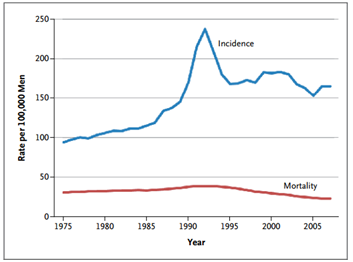Prostate cancer is the second most common cancer in American men after skin cancer. In 2015 alone, there will be an estimated 220,800 new cases of prostate cancer, with a new case occurring every 2.4 minutes.[1] Prostate cancer can be a serious disease, but a majority of men diagnosed don’t actually die from prostate cancer,...
Tag: prostate cancer
Prostate Cancer: Cyberknife vs. Robotic Surgery
What is Cyberknife? Cyberknife is a form of stereotactic body radiation therapy (SBRT) and robotic-assisted radiosurgery (not actual surgery) that utilizes a computerized robot to automatically deliver high doses of radiation to the prostate gland. Fiducials are implanted into the body so that the Cyberknife machine can adjust to movement during each treatment. Who is...Continue reading
PCA3 Test For Prostate Cancer
What is the PCA3 test? A PCA3 (prostate cancer gene 3) test is a simple urine test used to predict the likelihood of prostate cancer. Specifically, it is an additional tool used to determine whether a prostate biopsy is necessary. The PCA3 is specific for prostate cancer as the prostate cancer gene is only produced...Continue reading
Prostate Cancer: Voices of Experience
Patients newly diagnosed with prostate cancer have to make difficult decisions about their care. Men who’ve been there have joined Vanderbilt University researchers to personalize information on treatment outcomes. Every year, 240,000 men in the U.S. are diagnosed with prostate cancer. Seven years ago, 72-year-old Ralph Conwill became one of them. “You hear the words,...Continue reading
Men’s Health and Your Pathologist
I am a pathologist. You probably have never met me but I have spent hours studying your biopsy slides, making a diagnosis and ensuring your blood tests are accurate and precise. Examining specimens from patients of all stages of life, the pathologist diagnoses all types of illness, from cancer to chronic diseases, such as heart...Continue reading
Father’s Day: Get Screened For Prostate Cancer
With Father’s Day coming up this Sunday, many wives, children, and families will be searching the perfect gift to give a father that shows them how much they appreciate them. The best gift you can give a person is their health and well-being. Being that prostate cancer is the second most common cancer among men,...Continue reading
7 Reasons Your PSA May Be Elevated
Prostate cancer An elevated PSA could indicate prostate cancer. If you have an elevated PSA, your doctor will also do a digital rectal exam to see if there are any suspicious lumps present on the prostate gland. If they suspect prostate cancer, a prostate biopsy will be recommended. It’s also important to monitor any changes...Continue reading
Testicular Cancer May Raise Prostate Cancer Risk
According to a new study at the University of Maryland School of Medicine, men who have had testicular cancer may have an increased risk for prostate cancer. While there have been previous studies that have shown an increased risk of prostate cancer in men who have previously had testicular cancer, this is the first one...Continue reading
Distant family history indicates prostate cancer risk
New research says having a distant relatives with prostate cancer can indicate a man’s risk of developing the disease himself, according to a new study from the Huntsman Cancer Institute at the University of Utah. The study was recently published in the journal Prostate. Having a family history of prostate cancer is one of the...Continue reading
Exercise increases prostate cancer survival
A new study from the Karolinska Institute in Stockholm, Sweden has found that men with localized prostate cancer who exercise have better survival rates than men who don’t exercise. The study was published in December 2014 in the journal Cancer Epidemiology, Biomarkers & Prevention. In the past, research has suggested that exercise could reduce prostate...Continue reading

